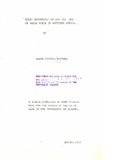| dc.description.abstract | Southern Africa is a region of important economic and strategic interests to most countries of the world. Little surprise therefore that its political situation, namely,_racial domination and its various manifestations receive wide attention in international:forums but not so however, the legal issues posed by that political situation. -This is regrettable in view of the interaction of political action and legal dictates. But to regret a situation is not enough; positive action must be taken to alleviate or remedy it. This Thesis therefore attempts to expose some of the legal issues posed by the political situation in Southern Africa.
'
The politico -legal history of the territories is briefly examined. That examination leads to the conclusion that from the earliest time of European settlement in the region there has been an inexorable deterioration of race relations culminating in the depriv~tion of the non-Whites of most.political, civil and economic rights. That kind of deprivation is legally analysed and found to constitute a denial of self-determination. Next, self-determination is demonstrated to be an international legal right applicable in both independent states and non-self governinG countries depending on whether whui: l[~ alleged to be lacking is internal or external selfdetermination. From the conclusion that the peoples of South Africa and Rhodesia are denied internal self-determination, the Thesis focusses on the means oᆪ redressing the situation.
Armed struggle in pursuit of self-determination is already in progress in Southern Afric'a. The
legality of both that struggle and external support to it are investigated. Both activities are found
to be legitimate. The Cotollary is that forcible denial of self-determination and external support ,
' to those who do' so, is illegitimate.
The international legal status of the Freedom ᆪighters is the last major issue to be explored.
,The conclusion is reached that they are soldiers engaged in a legitimate international armed conflict who should, tthe absence of conventional norms to that effect notwithstanding, upon capture, be treat- ed as prisoners of war. The final chapter views the conclusions
reached in t~e 00urse of' the Thesis as concrete evidence of the progressive strides that inter-
national law has taken since 1945. That progress itself is seen as largely facilitated by the ernergence of several countries 'of Asia and Africa from the shackles of imperialism to independence, and their' vigorous espousal of issues relating to colonialism
in world forums.
The view is also taken that to postulate that the liberation struggle and support to it are legitimate does not dramatically further the attainment of self-determiLation by the peoples of southemAfrica. Mindful of that v i ew , it is suggested that the best sJlution of the problems of
Southern Africa is for those states with leverage over the delinquent regimes to use it for the
purpose of persuading them to grant self-determination to those deprived of i~. .The Thesis r'e cogn i.s e s that if that solution is not adopted, or i~~ails to achieve thp. desired result, the other alternative of course, for the forces of liberation to carryon the struggle until self-determination is attained. | en_US |

